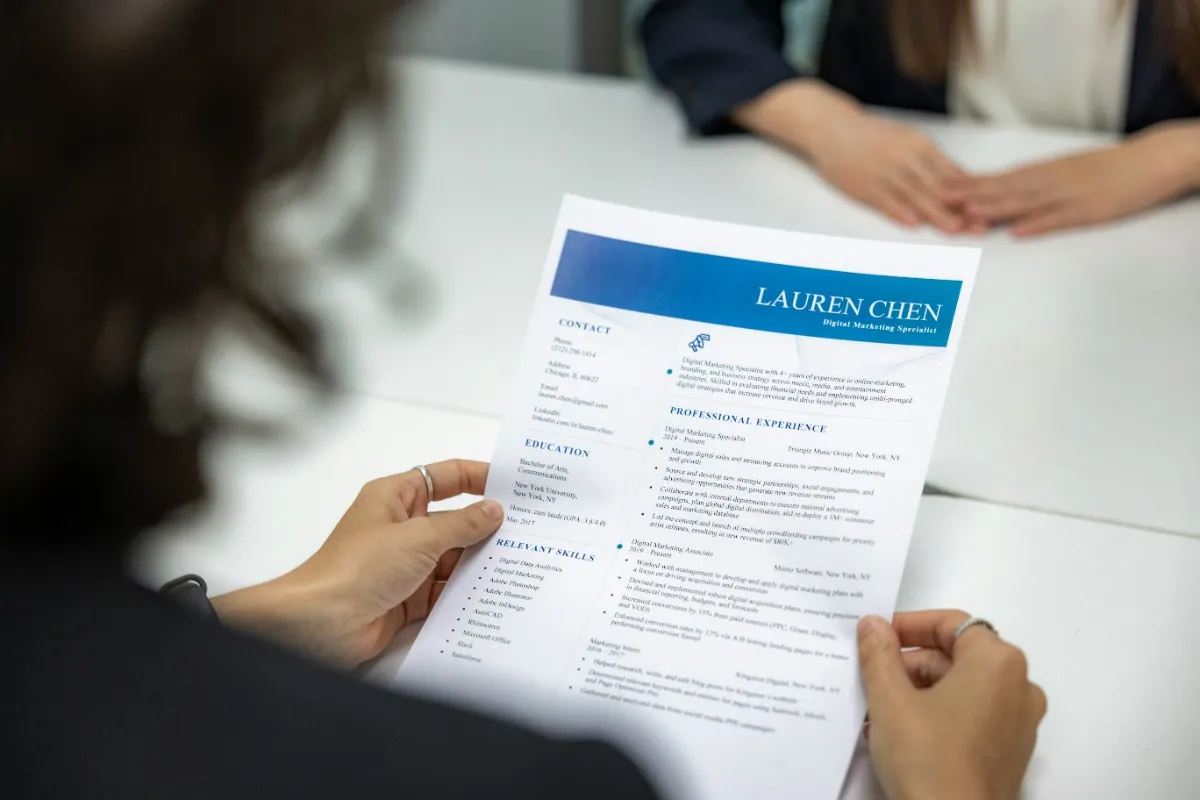31 Best Ways to Sell Tickets for Your Event
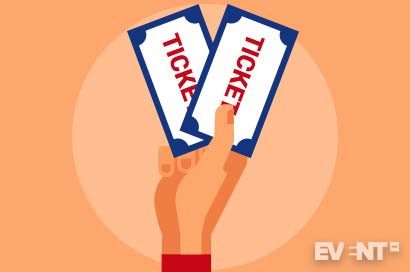
Skift Take
Of course you do. Many of us can’t count on selling out at every event. We get that.
We also understand how difficult it can be to stay abreast of best practices and new strategies. There are a lot of things involved. Here are just a few of the questions you need to grapple with:
To help you sort through some of these questions and sell more tickets, we’ve studied and scouted some of the most successful events (and taken heed of what doesn’t work) to bring you a list of the best ways to sell tickets to your event.
In this article, our ticket selling tips are broken down into 6 sections:
Event Ticket Selling Online
Unless your hosting a conference for an association of Luddites, your audience is likely going to discover your event online, and there are so many channels you can exploit to reach them.
Online sales are likely going to be the bulk of your revenue, so you want to make sure you are paying attention to the following.
Best Places to Sell Event Tickets
Landing Pages
There are many ways to use event landing pages to sell tickets. The advantage of using a landing page instead of referring interested people to your website is that a landing page offers a much more streamlined experience in an environment that is solely branded to your event.
Everything they need to know about the event is right there, paired with a clear call to action (CTA) and path for purchasing tickets. When interested parties are referred back to the general company website, you run the risk of the visitor getting lost or distracted by other information.
Whether your web designer builds it or you use a DIY platform, here are a few things to keep in mind:
Here’s an example from an upcoming EMB webinar landing page:
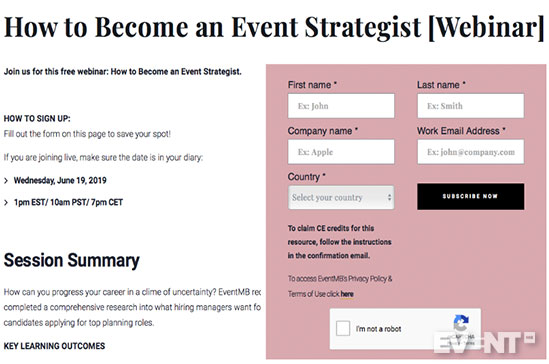
Web Page Widget
Some ticket selling software or registration software (and even some WordPress plug-ins) offers widget capabilities. A widget sits right on your website and looks like it’s part of your design, but it’s actually powered by the ticket selling software. It can normally be customized and branded to match your website.
Implementation will depend on the platform, but normally it involves some version of the following:
Social Media
You are doing yourself a great disservice if you don’t share your event ticket purchase information online in a way that interested prospective attendees can share within their network, too.
Social media is an essential component of the online event marketing for any public event or meeting that a large enough network can opt into, and facilitating ticket sales directly on the platform is a great way to reduce friction and barriers that might undermine your conversions.
Bonus Video:
Here are a few basic ways to get social media working for you:
Check out this example from Facebook.
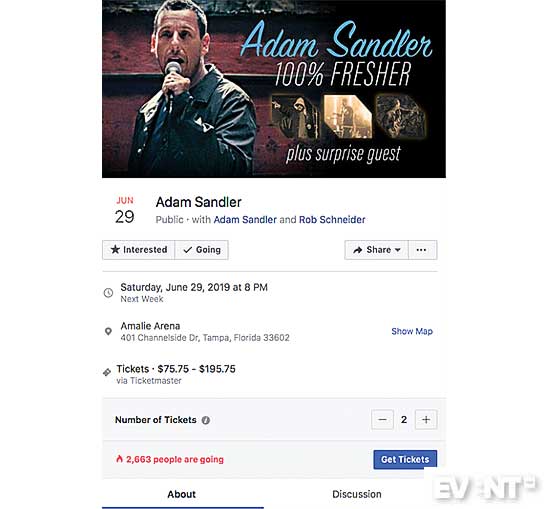
There are many benefits of Facebook events:
Live Chat
People often ask questions about something their registration hinges on. Forrester Research conducted a study called “Making Proactive Chat Work” in which it found that “Many online consumers want help from a live person while they are shopping online; in fact, 44% of online consumers say that having questions answered by a live person while in the middle of an online purchase is one of the most important features a Web site can offer.”
This translates to events as well. Sometimes simple questions hold up a ticket purchase. If they can’t get an answer, they won’t buy a ticket. Making yourself (or your team) accessible via live chat gives them a channel for immediate answers, minimizing the ‘missing information’ hump and allowing them to get on with registration.
Live chat also enables you to improve the registration experience in a number of ways:
Here are some things you can do to create a good chat experience:
Ways to Boost Your Online Event Sales
Tickers
Another clever trick you can do to sell event tickets online is to add a ticker countdown or a ticker of recently registered people on your landing page or a website widget. Depending on the event, you can convey a sense of urgency by indicating that the event is selling out, or a sense of FOMO by indicating how many people have registered so far.
Both of these options draw interest in your event and play on the fear of missing out, which we’ll cover in more depth in the ticket selling strategies section.
How to make the most of your ticket ticker:
This example shows a countdown clock of time left to register:
Paid Advertising
Paid advertising in online newspapers, magazines, and industry blogs is an effective way of grabbing attention and generating interest.
Pay-per-view advertising allows you to control costs by setting a maximum daily budget. This involves tracking views or impressions of your ad and paying based on how many people have actually seen it. Once your daily budget for ad views has been reached, the ad will stop displaying. This way, you never go over budget.
One way of offsetting the costs of paid advertising is through sponsorship. Sponsors are keen to get their logo and message out. You just need to ensure you provide the demographic they’re looking to reach.
How to improve your paid advertising:
Pay Per Click Advertising
Pay-per-click (PPC) advertising works similarly to pay-per-view advertising, except that you pay for people who actually click on the ad rather than just people who look at it (or scroll past it in a feed). In this way, it can be more valuable, but how much it will cost depends on how much competition there is in your market segment.
PPC works with keywords, so you need to use good ones for your event. Of course, you’ll use the event name and any subset of that, the industry it appeals to (such as “best conference for sales professionals”), and anything else you think people would use to search for your event or something you can help with. There are books written on keyword strategy, so we won’t go into all the details here, but there are a few things to know.

How to get better results with PPC:
Remarketing
If you've ever had a potential attendee come to your ticketshop or website and leave without purchasing a ticket, it might be time to employ remarketing.
There are many possible reasons as to why they didn’t convert (e.g. had to run into a meeting, lost service on the train, etc.) that might not have had anything to do with changing their mind, so it’s good practice to trigger a reminder and send out an online ad to entice the completion of a ticket purchase.
By collecting remarketing data, you can start to build out numerous audiences that you can retarget with online ads using Google AdWords. Here are a few tips on how to rock remarketing:
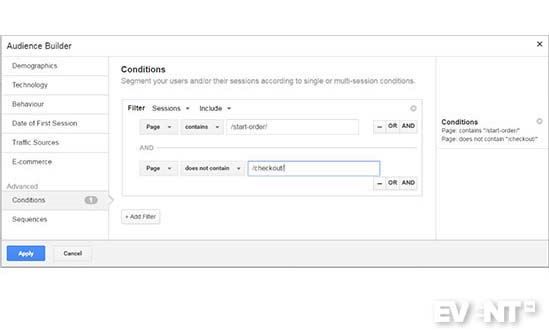
How Data Reveals The Best Ways to Sell Tickets
Acquisition Reports
Acquisition reports in Google Analytics illustrate how users arrive to your site (or ticketshop). This provides you with insight into which channels your potential customers are using to enter your website. These might include search platforms, any paid advertising campaigns you’re running, social media, and email campaigns.
Acquisition reports can tell you which marketing channels have the most impact on your registration, which can help you make crucial decisions about which channels to invest in, double down on, or remove from your strategy.
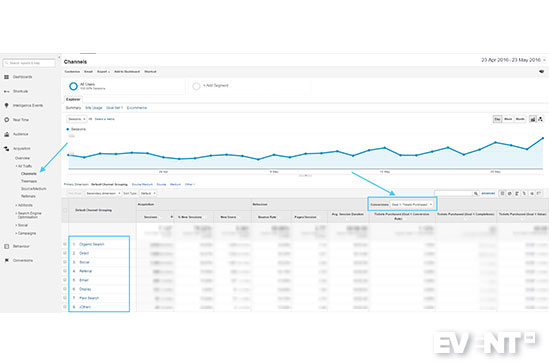
For example, say you’re putting on a music event and you’ve spent some percentage of your marketing budget with a particular online music magazine that seems to fit within your target audience. Comparing your ad spend with the amount of converting traffic it’s bringing in will tell you how expensive each qualified lead from that tactic is. If the ad generates less traffic per $1 than other channels, you know you should dedicate more to those.
These kind of questions create healthy debate for your business as you should always strive for maximum ROI when spending advertising budget.
Make your acquisition report more effective:
Behavior Reports
Once you have your potential customer on your website (or ticket shop), what are they doing? How are they interacting with your website and could there be improvements made to help increase conversion of ticket sales?
The behavior report can help with highlighting pages or elements on your website that are performing well or, more alarmingly, causing users to drop-off (bounce) before purchasing a ticket. This can help you identify if the ticket purchasing journey is too clunky. By utilizing this report, you can be confident in your decision to remove a page or redirect traffic to better performing pages.
Maybe you created an interesting video that is performing really well and generating a lot of engagement. You might try diverting your banner advertising links directly to this page, moving the video to the page you want people to go to, or putting a compelling CTA in the video directing people to the registration form. Make the most of your audience’s time and give them what they want without a lot of search on your site.
Acing your behavior reporting:
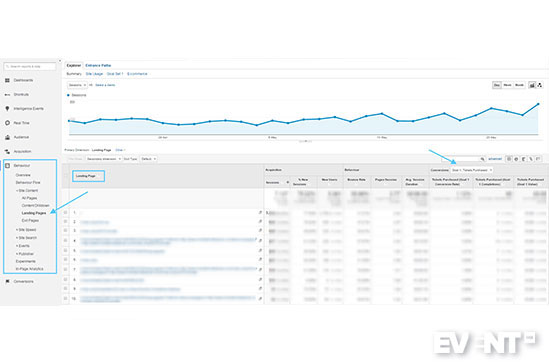
How to Sell Tickets for an Event with Tried and Tested Strategies
Online isn’t your only option when it comes to selling more tickets. Don’t forget traditional media as well.
Getting the Word Out
Press Releases
Your press release helps you reach a larger audience as it is circulated. You can do a press release online or submit a paper, faxed, or email copy to a distributor. There’s also your local newspaper or media outlet.
How to write a press release that gets read and circulated:
Leverage the Reach of Event Sponsors
Event sponsors have a reason to want to see you succeed. Make sure they have the necessary marketing materials to help you sell event tickets. Suggest they reach out to potential customers who may benefit from coming to your event. If you leave promotion up to them and just ask them to do it without giving them the tools, they won’t do it. Like you, they’re busy. Make it easy by providing them with the following:

Use Referral Incentives and Word of Mouth
Turn Attendees into Reps
Why not incentivize your audience by providing the opportunity for individuals to become reps for your event? Sometimes the ability to pre-sell tickets is enough reward enough for them as they get to offer their tribe something no one else has. Other events choose to compensate them in some sort of commission form.
To do this:
Don’t forget your speakers and entertainers. Provide them with something like this so you can leverage their audience as well:
A Broadway singer at #SMMW19?! Yes, that’s right! We’re thrilled to have @evynnehollens here with us at the closing keynote this afternoon for a performance you won’t want to miss! pic.twitter.com/jBNhHJeH34
— Social Media Marketing World #SMMW19 (@SMMWConference) March 22, 2019
Cross-promote Other Events
If there’s an event in your community that’s similar to your own but not a direct competitor, you can approach the other planner to talk of cross-promotion opportunities. Sometimes event planners have complementary events that they’re planning and they’ll cross-pollinate the lists to reach a slightly different group.
Think about other partnerships that give you access to a different base as well. Approach other industry organizations whose members may benefit from your event, especially if that organization doesn’t have their own conferences or events. Speak to them about how you may arrange a mutually beneficial situation.
Sell Event Tickets With Time and Value-based Incentives
Ticket Selling Strategies and Tactics
When trying to increase ticket sales, in addition to reaching the audience, you can employ a little psychology to create a perceived need to take action and make a purchase.
Group and Returning Attendee Discounts
People are more likely to attend an event when they know another attendee. Offering group discounts for five or more tickets can help you sell more tickets.
While we’re talking about groups, you may want to consider offering either presale tickets to last year’s attendees or some other special offer, like a returning attendees’ VIP session. It makes them feel like they’re being rewarded for their loyalty.
This example gives a 50% discount if your register now for next year’s event as well.
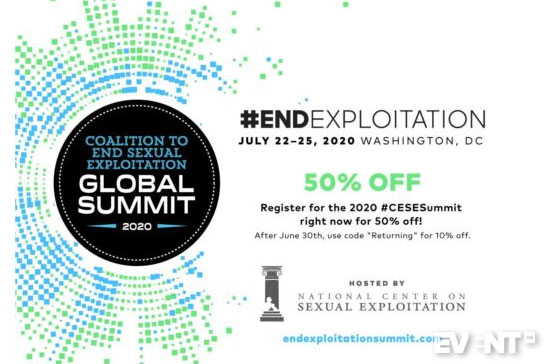
‘What’s In It For Them’ Visuals
Creating the right content to get attention is an important strategy to increase event ticket sales. You want to be clear about what’s in it for the future attendee, not why you want to sell tickets. There is an abundance of content on social media, so the only way to cut through is by providing something that is actually worth sharing in a visually eye-catching way.
Here are some tips on how to convey the right message:
Scarcity and the Fear of Missing Out
People are afraid of scarcity, of missed opportunities. Convincing people that the supply is time-limited or is not equal to the demand is a great way to move them to take the action to buy.
This fear of missing out (FoMo, as it’s commonly referred to) leads people to do crazy things, like stand in line for days before a new store opens or a new technology goes on sale.
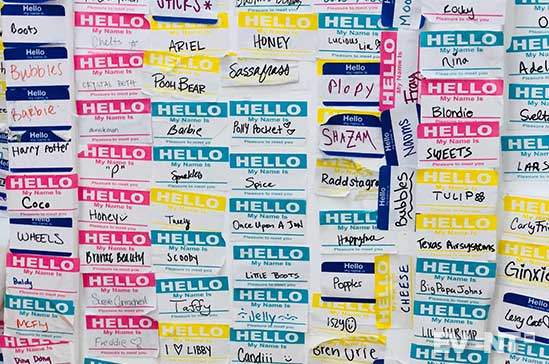
Here are a few things you can do to give people a motivating sense of FoMo:
Velvet Rope
Familiarize yourself with the term “velvet rope.” The idea, which originated in nightclubs, is to allow non-VIPs to see enough of what is going on in the VIP area that they want to be a part of it and pay for access.
Here are a few ways to exploit the velvet rope to encourage more ticket sales and upsells:
VIP Early Access or Pre-Sale
If you have an email list (or want to create one), consider placing a call out to those who want to be notified of pre-sale ticket opportunities. Encouraging early registration will help you to get a better early projection of the event attendance and popularity, too.
American Express, Citi, and CapitalOne credit cards offer this as a perk for card holders. Card holders can get presale tickets to a number of concerts throughout the year before the public can purchase them. Amex also offers special invitation only experiences for VIP tickets to Wimbledon and other exclusive opportunities.
Take a look at what Phish did in order to line up early sales in this evite.
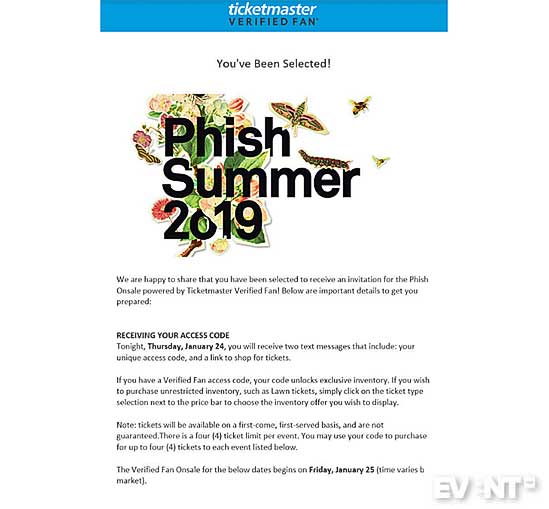
Here are some things for you to try if presale tickets are possible for your event:
Early-Bird Discounts
Another way to drive early ticket sales is to offer early bookers a special time-limited discount. This is less suitable for events that normally sell out, but if yours could benefit from some early momentum, this is a great way to kick things off.
Social Boom Conference created an early, early bird for its attendees by offering a steep discount before they finished the event website. Once the event website design was completed and launched, the discount would disappear.
The FoMo mechanism was triggered thanks to ambiguity about when the site would be complete. No one knew when the site would launch, so if they wanted the discount, they had to act quickly.
The steps for activating an early-bird discount are pretty straightforward:
Last-Minute ‘Buy One, Get One’ (BOGO)
Some event planners are hesitant to offer discounts as they feel it devalues their event. However, a BOGO offer is a way to get more people to the event in the hopes of bringing them back next year. If you have additional merchandising available or extra experiences for additional fees, you can still make money on the free (get one) ticket.
This is a good tactic to use when your attendee numbers are lower than you hoped. It also may be just what you need to swing a few last-minute decisions. When attendees are able to bring a friend, they’ll feel more comfortable. It also may make the trip more affordable for them to have someone to share the costs with.
There are a few things to keep in mind, however:
Limited ‘Fire’ Sale
Nothing gets social media communities excited quite like a limited time sale. It will boost your ticket sales during that period, but the impulse to share the deal within your audience’s network will have residual benefits as well, thanks to the spread of awareness.
How to host a successful fire sale:
Activity Bonuses
Activity bonuses drive ticket sales by offering registrants an additional incentive to purchase. The activity could be as simple as a complimentary dinner or as involved as access to a day trip. Plus, if you have tickets you’re selling for an additional experience that isn’t quite selling the way you thought, you can use that as a way to fill the sub event.
Pitching Your Event to Your Audience
Storytelling
When it comes to event marketing and event ticket sales, a story can be as simple as a photograph with a caption. Because of limited attention spans you need to get your story out as simply and effectively as possible.
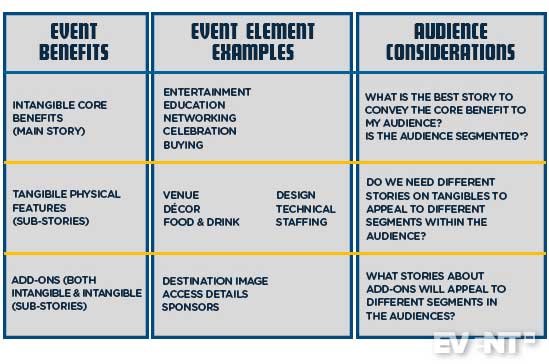
Showcase the Host City
Where the event is held is often a big draw for ticket purchasers. That’s why some event planners showcase the host city or venue as closely as the keynote speaker or headliner.
Notice in this example, instead of a drop-down or list of venues and host cities, they create an appealing way to call attention to the options.
Here are some tips for conveying all that your city has to offer:
Sell More Tickets Online with Earned Content
Earned content refers to the content, blog posts, and social media created by other people. It is highly valuable, as no amount of paid advertising can beat an endorsement from an impartial party on their social media profile or blog.
You want other people talking about your event as much as possible. How you get that kind of attention is by providing value. You can do this several ways:
Your attendees are your champions. There have been lots of articles written on how to get your attendees tweeting before, during and after your event, and there are lots of tools to help you do that.
See, for example, Kelvin Newman's post on Power user Methods for Twitter.
Don't forget about your volunteers, they may be your secret marketing weapon. The chances are you have a few social media gurus hidden in your team. Scout them out or recruit them to sell more event tickets.
Everything You Need to Sell Event Tickets
While the psychological strategies and sales incentives are important, we would be remiss if we didn’t mention the basic pieces of the puzzle:
Website
An event website should inspire trust. It’s a good idea to include your top speakers on your homepage, as well as previous participants, real testimonials from real people, celebrity endorsements, press mentions, pictures of the previous event, etc.
Always keep your website up-to-date. Never leave outdated information published on the site; it sends the wrong signal to potential participants. Pay special attention to prices and offers. Always keep your visitors in the loop by embedding a Twitter/Facebook feed or by keeping an active blog.
Follow the basic rules of quality web content:
Bonus Tip
If this is an annual event, the moment one event ends you should begin selling the next. Check out this page that Social Media Marketing World keeps updated.
Registration Platform/EMS
One of the most efficient ways to sell tickets is through a registration platform or an event management system (EMS). The primary benefit of doing so is a more seamless workflow around selling, tracking, and analyzing as the ticketing platform and other tools can usually be integrated (if they’re not already built into each other in one platform).
Some EMS’s also have content management systems that allow for quick changes to websites and forms. Some also offer templates for landing pages and a ‘what you see is what you get’ editing functionality that allows you to easily change and personalize the site without coding or a design background.
Things to look for in an EMS or registration platform:
Call to Action
A call to action (CTA) is a prompt, typically on a webpage, for the site visitor to do something. It’s meant to provoke an immediate response, which can be anything from buying a ticket on the spot or moving into the next step of the marketing funnel, depending on the stage of your event marketing the visitor encounters.
Here are some things to keep in mind when designing a CTA that works:
Pricing
You should always start off with the average price at which you would like to sell your tickets and build all ticket categories, special offers, and discounts based on that price. So if your average price is $200, you should price all your tickets from $150 to 400 EUR. This will allow you to include additional discounts and special offers.
Follow these four pricing tactics to stimulate sales.
Some planners believe you should never offer a lower price closer to the event than you did when they first went on sale. Although this is fine in some businesses (like the airline and hospitality businesses), it is extremely unpopular in the events industry.
People that have bought a ticket three months before the event may be upset if they find out they can buy a cheaper ticket one week before the event. This is why “last-minute” offers should be used only when necessary and should contain some reason or differentiator/detractor, such as not receiving keynote session entry. Note our previous comment in the section on activity bonuses and conditioning people to wait for a deep discount.
Registration Form and Checkout / Ticket Selling Software
Many people drop out during registration. The registration form is the place where you can lose all impulse buyers, so it is essential that you do not underestimate the importance of your registration form in your ticket selling software.
Bonus tip
When auditioning ticket selling software, make sure to pay close attention to capabilities within the form. How much can your personalize and design to create the form you want and how much is a template that may make the process clunkier than it should be.
IN CONCLUSION
The best ways to sell event tickets combine simple tactics to increase your audience reach (mainly by isolating the best place to sell tickets online), use proven ticket selling strategies and ensure you’re employing the basic components of a good ticket sales campaign.
Using the right sales techniques to sell event tickets will help you convert those numbers reached in your marketing to tickets. Ensuring that you implement effective pieces of a good event marketing campaign will help you build more meaningful relationships and sell more event tickets in the future.
